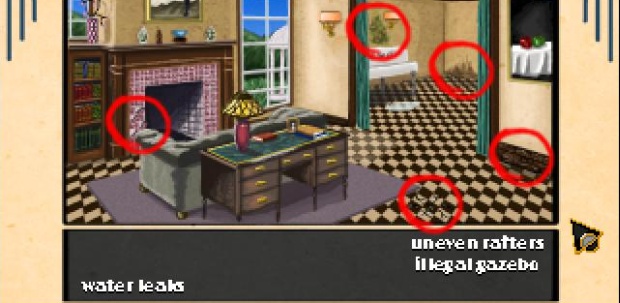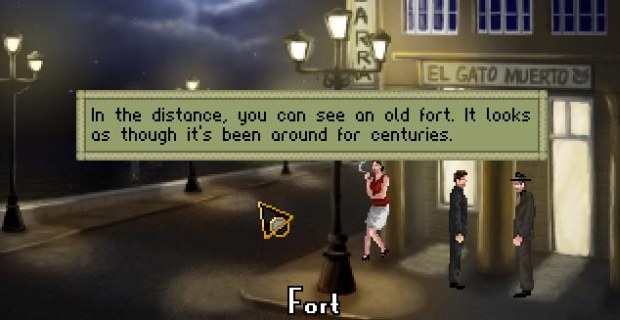Wot I Think: A Golden Wake
A Golden Something
There’s something I wish I’d known as I began playing retro point and click adventure A Golden Wake. I wish I’d known that it was, in large parts, a true story. The reason I didn’t know this was because it began with a statement explaining that despite its historical setting, the characters and events were fictional. Here's wot I think:
It turns out Coral Gables is a real city in Miami, Florida (you may have already known that, especially if you live on that continent), which was really established in the 1920s by a man named George E. Merrick, there really is a Biltmore Hotel, and the city really was affected by the hurricane of 1937. The game’s tale of real estate is based in a genuinely interesting time of boom and bust in American early 20th century history. In what is ultimately a rather bland game, I think I’d have cared a bit more if I’d known.
Not a lot more, I’m sad to say. Your character, one Alfie Banks, is a real estate salesman from New York. Following a rather unrealistic incident at his work, he makes his way south to chase the property boom in the rapidly developing Florida, to pursue his real estate career there. Yes, this really is a real estate salesman sim.
Starting out in Florida 1921, you must begin by proving your worth to the big name in town, one George Merrick. To do this, and this is the beginnings of why the game opens up with its mighty disclaimer, you must bully a man out of his home so Merrick can build on his land, steal plans (that you’re told were already stolen from him) from a rival realtor, and convince a seemingly straight journalist to write puff pieces about him. And you do all this with Alfie’s utterly charmless salesman ways.
Used occasionally, and certainly too occasionally for it to work well, Alfie has powers of persuasion. This allow him to discern the weaknesses and interests of a person, and play his patter accordingly. Except, despite the appearance of a Sherlock Holmes-style intuition, it never really works. The “correct” responses rarely match up in a meaningful way with the information you have, and the system feels far more based in luck than anything else. Never mind that most of the time this isn’t even applied, and the script just does the work for you.
The game continues on in clusters of three fetch-quests, which in some way becomes the focus of Alfie’s near-existential frustration with life. That’s almost an interesting idea, that the central character is demoralised by the mundanity of his existence, using the most mundane of adventure tropes. Except, you know, apart from the bit where you’re using the most mundane of adventure tropes.
However, all the interesting events seem to take place in the fades to black, as the time leaps forward in years. Midway through the game it finally stops being literally only about real estate, and starts to work in a completely hokum tale of the mob (again, you can understand the opening disclaimer, as real places and people are associated with them).
The major issue that Alfie is just a blandly unlikeable person. His charm is fake, but there’s no establishment of his reality. You don’t know him beyond the laminated veneer he presents as he sells. So when he starts to have huge crises with where his life is going, they’re out of nowhere, and completely unconvincing. The decisions he makes, despite any choices you might try to make, are ridiculous. And by the end of the game his wild fluctuations in personality and behaviour become farcical. His entire arc appears to be based in his having incongruous tantrums.
The puzzles aren’t, for the most part. It’s about as simple as point and click gets, with your using the only available inventory item on the only available object to move on in most places. There’s even a hidden object puzzle at one point, which is perhaps not ideally suited to a game hand-drawn in pixels running at 640x400, involuntarily stretched to the full size of your monitor. (Be warned, the usual Alt-Enter to switch to a window doesn’t work here, but instead resets the game to the opening titles!)
The art is nice enough, but never stunning. When opting for Adventure Game Studio in its late 80s form, there needs to be a lot more flourish to make it feel worthwhile. The character portraits are often poor, and the animated characters they represent only occasionally look alike.
The voice acting is lovely, nearly every character well presented. There are a couple of weaker ones, but of the main cast it’s a very strong showing. It is a bit of a shame that the font used for the un-spoken information has only a single pixel difference between ‘o’ and ‘a’, which makes parsing it occasionally annoying. Although it did lead to a favourite moment where I was told,
“In the distance, you can see an old fart. It looks as though it’s been around for centuries.”
There is definitely a lot to be said for using adventure games to explore more mundane events. They don’t all need a murder, or a ghost, or a time travelling robot. But I would argue they do need something more than real estate. There was a large opportunity to really explore the historical significance of the establishment of Coral Gables, the City Beautiful movement it inspired, and the era of prohibition and the Great Depression. But instead these are just background events to tell a remarkably plain story about an unremarkable man.





